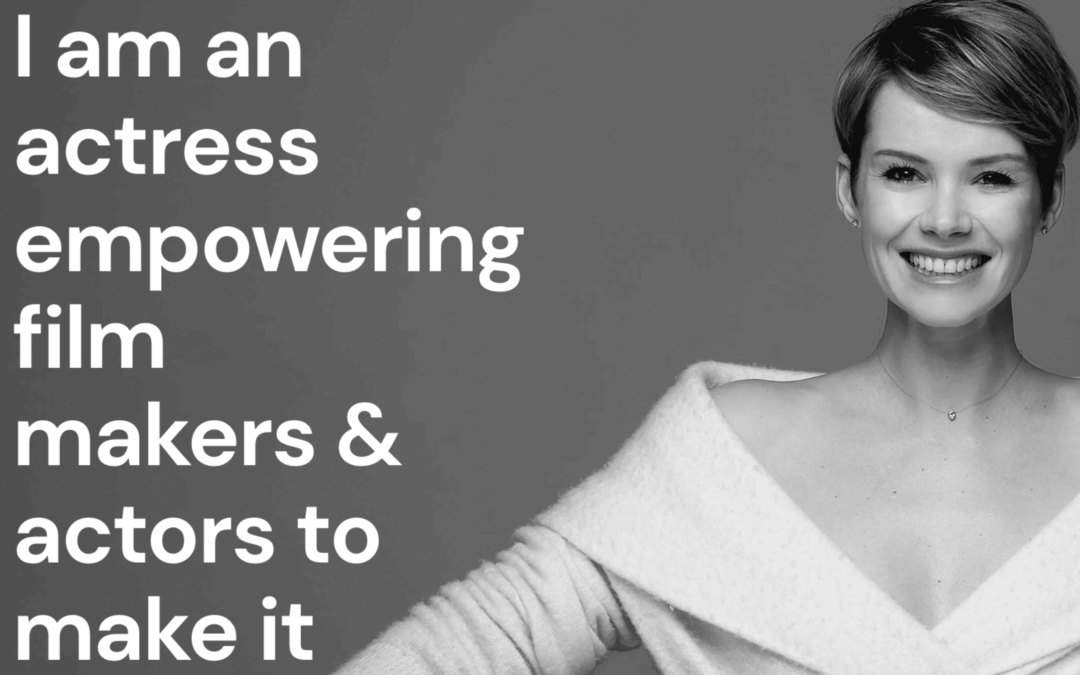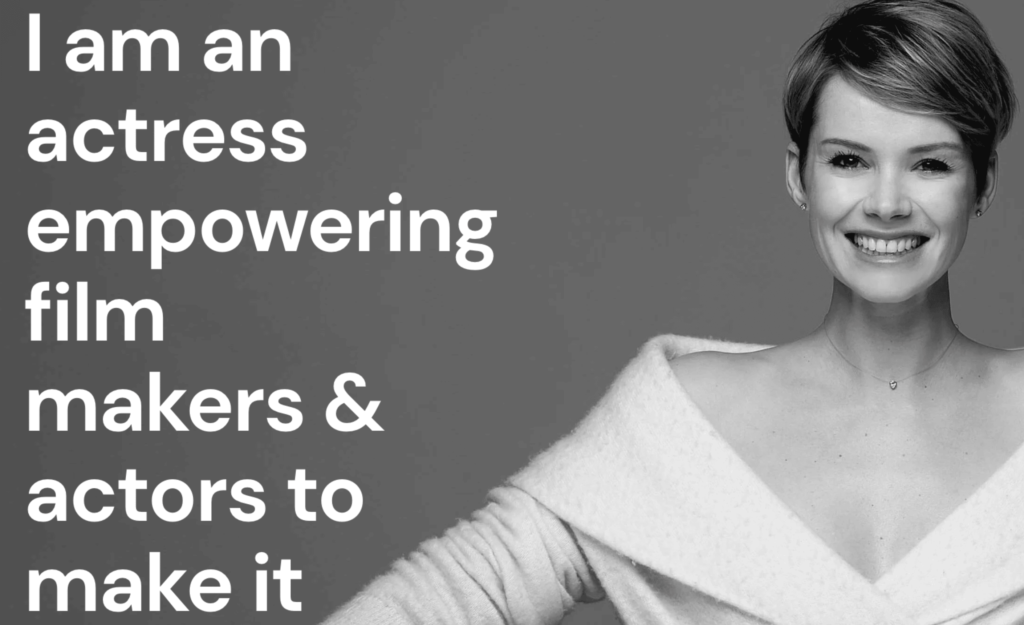The Actor’s relationship with social media and their Digital Self
Intro: Andrea Osvart is a multi-award-winning European actress with nearly 25 years of experience in the international entertainment industry and over 50 credits starring opposite movie stars like Robert Redford, Brad Pitt, Heath Ledger, Clive Owen, and JK Simmons. Andrea’s mission is to educate actors about career longevity through her method. Today we dive into the nitty-gritty of what that is exactly: we’ll talk about Andrea’s background, why she became an actor, and also what led her to become someone who coaches actors on:
- how actors can stand out from the crowd,
- what actors should prioritize, and
- actors’ relationship with social media.
Patrick McAndrew’s Actorcast Podcast Excerpt:
Patrick: Andrea, an actor’s career is filled with ups and downs, and you’re coaching performers from this perspective. So let’s start by sharing a little about yourself and what led you to coach.
Andrea: Well, I’ve always wanted to be an actor. However, it was challenging because I grew up in the Hungarian countryside during communism. So there were few opportunities, and it was not a realistic dream to become an actor and make a living out of it. So I started modeling as a teenager; then, I moved to the capital city, where I enrolled in acting schools and started doing my first training and castings. Then I moved to Italy and lived in Rome for about ten years, where my acting career took off. I did stand out from the crowd as a tall blonde who spoke Italian. Then, after another ten years, I moved to Los Angeles because I felt the ambition and the willpower that could evolve my career even more. So I lived in LA for three years before moving back to Europe again, where I feel at home.
Patrick: It’s great you have this international perspective on the wide world of acting. It’s given you this very interesting perspective on how this world works and how that has helped form your work as coaching actors.
Andrea: It’s funny you mentioned the word perspective because I talk about perspective in my program for actors: a perspective is a “point of view” but also a “point of You.” If you can’t find artistic fulfillment in your career, it is always good to look at it from a different perspective. I’ve been in so many markets, and I’ve lived in so many countries, speaking multiple languages; I find it great for actors to relocate physically for at least a few months from time to time because it gives them such a new spark and a different perspective on their career, on their personal development.
Even on the market, they have been part of, as any type or character works completely differently in various markets. Standing out from the crowd helps people remember your name and type more easily. In Italy, for example, they easily identified me with that “short-haired girl” with a foreign accent. That’s why I always recommend actors change their perspectives and move around a bit: If they’re based in America, they should visit Europe. If they’re European actors, it’s nice to go to America for a few months to experiment with multiple markets.
Patrick: Do actors get in their own way sometimes when it comes to changing how they approach their work or the business: and if so, how could they overcome that?
Andrea: Actors usually stand in their own ways because they have inner programming of uncertainty, lack of confidence, and self-doubt that arise subconsciously. So it is very important to learn how to leave these old survival mechanisms behind and become self-confident actors.
Patrick: As actors, we tell stories and perform the human condition, but those experiences we have in our actual life form our work as actors.
Andrea: Yes. And when actors experience rejections, are out of work, or are transitioning between two jobs repeatedly, they easily lose the motivation and joy they once had when they started acting. So on these occasions, it is important to meet new people, see things from a new perspective, and let yourself be inspired again by someone or something new.
Patrick: For actors in the industry for a few years, they need help getting traction and standing out, even if they have been training, working, and developing their craft regularly. Actors need help building relationships, whether it be with casting directors or agents, or managers. How do you believe actors can set themselves apart from the crowd?
The Actor’s relationship with Social Media and their Digital Self
Andrea: It is a very important rule not to destroy the illusion of the performance in the audience. So “as private people, actors should always stay behind the screen and the curtains.” Today, in this digital era with Facebook, social media, and the fact that we are pushed to gain followers and fans, likes, and comments, we are forced towards a phenomenon that is not what we are supposed to do. I know producers and casting directors also scout on social media sometimes. However, I still think that in most cases, casting directors go through the traditional industry channels and look for talents, not celebrities.
There are exceptions, of course: if you have a million followers, you might get a job because you have high market value. But other than that, I trust the industry platforms, and having your Digital Self should be the tool for an actor to use. Our “digital self” is how we present ourselves online. So my short answer to your question is: less is more. I do not promote myself too much on social media, and I wait patiently for the right project, which has worked so far.
Patrick: That’s very encouraging to hear, as I have a very big love-hate relationship with social media, and if I could choose not to do it, I probably wouldn’t. But there’s part of me that feels like I have to, and it’s so great that you touched upon that because that was one of the big questions I wanted to ask you about: the actor’s relationship with social media. You mentioned on your website that creating a social media presence takes a lot of energy, and it could sometimes be draining, depending on one’s investment. So, where should the actors’ attention be? Should actors focus on developing their craft as an actor, or should they be making sure that they post a ton of times every week so that casting directors, agents, and managers at least get the perception that they’re busy?
Andrea: It’s certainly not the right way of thinking, but quite the opposite: If you post too often, they’ll think you’re out of work, bored, and have nothing to do. Think about great actors: they never post as they’re too busy; they don’t need to. So I would say, yes, keep your online presence, but it’s enough to post once or twice a week, shift your focus back on the craft of acting and your true self, and don’t try to be liked so hard by the outside world, because you can get so easily lost in the digital world’s a trap. So instead of trying to find external validation, you should go back into your own world and work on yourself from the inside out.
What actors should prioritize in social media
Patrick: It is very easy to get lost, and it needs to be clearer for actors to figure out where they should focus: What should I be doing? Should I hit the ground running hard with auditions? Should I create my own work and see where that goes? What should actors prioritize in their work?
Andrea: It’s important to distinguish which stage one is in their career. If you are a beginner, it’s one thing; if you have already been in the industry for ten years, that’s another thing. Or if you’ve been around for 50 years, that’s again a different ballgame. I think actors, at the beginning of their careers, have to do both: They have to work on their craft of acting, attend acting schools, classes, courses, and training, but also network with industry people, be very good at the computer and be able to connect with the world online. However, if you have over 15 years of a career, then it is quite late to try to become an influencer because probably all the casting directors already know you. Unless you move to a new country where people don’t know you and where you have novelty value, it’s really hard to change the perception of people.
To do what you love, you have to love what you do.
Actors get different advice from different people. It’s so confusing because it might be that your agent tells you to post three times a day. You listen to them because you trust them and believe they want your best, but in the long run, you can get exhausted, and it’s so time-consuming., that you have no more energy left for what you love doing. So to be able to do what you love, you have to love what you do. So if you prefer to refrain from posting, it’s counterproductive to push it and to artificially try to create content if it’s not coming naturally from within. Instead of trying out and fake it on Facebook, it’s worth so much more to watch a great movie, read a book, or read some industry news that would enrich you and expand your industry knowledge.
Making the subconscious conscious
My work is very personal with actors, so we always go through a few initial sessions about who you are, where you come from, what your dream is, and what your goal is, and then we try to break it up into long-term objectives and short-term action steps. Then I also help actors clarify what they want and who they are: like making the subconscious conscious.
Patrick: I loved how you put it to clear the fog of everything that’s going on because there, in this industry, are so many different pathways and approaches to take with this work. A lot of times, we get into this work as actors being like, okay, I want to be an actor so long as I’m performing something, I’m happy. But, it is beneficial to have a strategy to develop clarity and create traction for ourselves.
Andrea: Also, because the devil never sleeps. There will be temptations for roles not aligned with your integrity. And if you accept those roles, then they will set the path to your future self. And it’s difficult, if not impossible, to come out of a perceived character. We can mention so many examples of when an actor is identified by the character they used to play for long years, if not forever. So it is very important that you align with your values and that the roles and the movies you have been involved with a fit you because if not, they can also ruin your career—even your life, in extreme cases.
Patrick: I greatly appreciate the work you’re doing for actors. It is great to have you on the show to dive into what you do and how you help actors. I’m sure our listeners will walk away inspired. Thank you so much.
Listen to the full podcast episode here.


Recent Comments